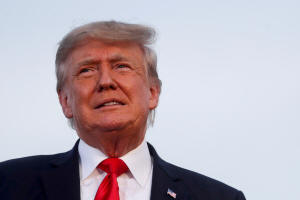Explainer: Can Trump use executive privilege to block Jan. 6 attack
probe?
 Send a link to a friend
Send a link to a friend
 [September 09, 2021]
By Jan Wolfe [September 09, 2021]
By Jan Wolfe
WASHINGTON (Reuters) - U.S. government
agencies have a Thursday deadline to produce documents demanded by a
congressional committee investigating the Jan. 6 attack on the U.S.
Capitol, including communications involving some of former President
Donald Trump's closest advisers and family.
The Republican Trump wants executive privilege to be used to stop at
least some of the documents from being transferred, a decision that
rests with the White House of his Democratic successor, Joe Biden.
Here's an explanation of how executive privilege works:
WHAT DOES THE COMMITTEE WANT TO SEE?
The House of Representatives Select Committee is investigating the
events leading up to and on Jan. 6, when mobs of Trump supporters
stormed the Capitol as Congress was meeting to certify Biden's November
election victory.

The panel has asked for White House communications records which are
held by the National Archives and Records Administration, as well as
material from the Departments of Defense, Homeland Security, Interior
and Justice, and the FBI, National Counterterrorism Center and Office of
the Director of National Intelligence.
WHAT'S EXECUTIVE PRIVILEGE GOT TO DO WITH THIS INVESTIGATION?
Executive privilege is a legal principle recognized by the U.S. Supreme
Court that allows the White House to refuse to comply with demands for
records such as congressional subpoenas or Freedom of Information Act
requests.
The principle is rooted in the idea that, for the White House to operate
effectively, some privacy should be given to presidential advisers so
they can have candid discussions.
A sitting president has in the past used executive privilege to keep
records and communications from an earlier administration secret, but it
is rare.
For example, Trump's White House cited executive privilege in 2018 to
withhold from the Senate more than 100,000 pages of records from
then-Supreme Court Justice nominee Brett Kavanaugh’s time as a lawyer in
the administration of former President George W. Bush.
Trump also asserted executive privilege over former U.S. Special Counsel
Robert Mueller's report, and said he would use the doctrine to block his
former National Security Advisor John Bolton from testifying in his
first Senate impeachment trial.
WHAT HAPPENS NEXT?

If the Biden White House says the requested materials are protected by
executive privilege, it will make it much more difficult for the
congressional committee to investigate Trump.
But Biden is expected to be sympathetic toward the panel's view that the
materials should be produced. In July, the White House said it would
allow former Justice Department lawyers to testify to a Senate committee
about Trump's efforts to overturn his election loss.
Mark Rozell, a political scientist at George Mason University who wrote
a book about executive privilege, said it should not be used to cover up
evidence of wrongdoing.
[to top of second column]
|

Former U.S. President Donald Trump looks on during his first
post-presidency campaign rally at the Lorain County Fairgrounds in
Wellington, Ohio, U.S., June 26, 2021. REUTERS/Shannon Stapleton

"Claims of executive privilege always weaken when
there is credible evidence of wrongdoing," Rozell said. "Congress's
investigatory powers reach very, very broadly in those
circumstances."
Biden's White House Counsel, Dana Remus, will likely be involved in
determining whether executive privilege applies to any of the
communications sought by the committee, said Jonathan David Shaub, a
law professor at the University of Kentucky.
Remus will also consult with the Office of Legal Counsel, a division
of the Justice Department, Shaub said.
"Whatever they turn over will be a precedent for the future," said
Shaub.
A White House official told Reuters that Biden "has been clear that
the events of January 6th were an unprecedented assault on our
democracy – and he believes they deserve a full investigation to
determine what transpired and ensure it can never happen again."
Executive branch agencies have been engaging with the Select
Committee and will continue to do so, the official said.
WHAT ARE TRUMP'S OTHER OPTIONS?
If Biden rejects Trump's view of executive privilege, as widely
expected, the former president can file a legal challenge in
Washington, D.C., federal court, said Michael Stern, a former
congressional lawyer.

Even if the courts reject Trump's arguments, he could still succeed
in slowing the investigation down, Stern said.
"If he is willing to pay for the lawyers, Trump could delay the
production of records for some time," he said.
Such a lawsuit would be likely be filed against the head of the
National Archives and Records Administration.
Rozell said Trump may be aiming to gum up the investigation until
November 2022, when Republicans hope to take control of the House.
"He knows Biden is not going to support his privilege claim, but if
he can tie it up in the courts ... he may be able to run out the
clock on the Democratic majority doing their investigation."
(Reporting by Jan Wolfe; Additional reporting by Trevor Hunnicutt;
Editing by Sonya Hepinstall, Scott Malone and Grant McCool)
[© 2021 Thomson Reuters. All rights
reserved.] Copyright 2021 Reuters. All rights reserved. This material may not be published,
broadcast, rewritten or redistributed.
Thompson Reuters is solely responsible for this content.
 |